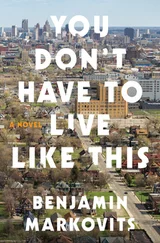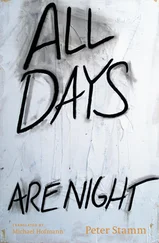One list among many, he thought. His life was an endless sequence of lessons, of cigarettes, meals, cinema visits, meetings with women or friends who basically didn’t mean anything to him, incoherent lists of little events. Sometimes he had given up trying to get the whole thing to make sense, trying to look for sense on it. The less the events in his life had to do with one another, the more interchangeable they had become. Sometimes he appeared to himself like a tourist, racing from one sight to the next in a city he doesn’t even know the name of. Loads of beginnings that had nothing to do with the end, with his death, which in turn would mean nothing beyond the fact that he had run out of time.
At the weekend, Mme Cordelier’s parents came and looked at the apartment. They liked it, and that same day drew up a purchase agreement. The Cordeliers wanted to have the walls painted, and the floors sanded. They didn’t want to keep any of the furniture.
The realtor said they wouldn’t sign the final contract for another six weeks at the earliest. Andreas said he would be moving out in a couple of days, and going abroad. The realtor said he could give someone power of attorney to represent him in front of the notary. The money would be transferred to his account after the sale.
On Monday, the furniture dealer came and picked up the furniture. He was about to pick up the statue of the Huntress when Andreas said he’d prefer to keep it. The junk dealer said it was valueless. He offered Andreas a sum for the furniture that was far too low. Andreas argued with him for the sake of it, and managed to get a little more money out of him.
Everything he owned now fitted into a suitcase, the same red artificial leather suitcase he had arrived with in the city eighteen years ago: a few clothes, toiletries, a sleeping bag, Fabienne’s letters, the cassettes, and the two books he had decided to hold on to. He wasn’t even taking his address book. He felt light, free of all his ballast. It was as though he had been asleep all those years, grown numb like a limb that hadn’t moved for ages. Now he felt that same pleasant pain that you feel when the blood shoots back into an arm or a leg. He was still alive, he could move.
That night was Andreas’s last in the apartment. He spread the sleeping bag out on the floor as on the first nights he had spent there, and, just as then, the apartment felt strange to him and a little frightening. He slept badly. When he woke up, it was just getting light. His footfall echoed in the empty rooms, and his cough sounded quite threatening. Andreas went up to the window and threw it open. It had rained a little overnight, and the cement slabs in the yard all glistened darkly. He lit a cigarette and smoked it without enjoyment. He watched a blackbird whistling and skipping from branch to branch. When he shut the window, he frightened it and it flew off. He had meant to stay a little longer to take his leave of the place that he would never see again, but suddenly it no longer interested him. It wasn’t possible to say good-bye to anything or anyone, he thought. The last look was just like the first, and memory was no more than one of many possibilities.
He wrapped the statuette in one of the curtains he had taken down from the windows. Then, without a last look back, he left the apartment. In the mailbox he found a couple of flyers and a letter, which he pocketed without looking for the sender’s name. He thought he should have gotten in touch with the post office before leaving, but then he had no forwarding address, and didn’t know where he was going. Presumably his mail would be returned to sender, with a little stamp, Addressee Unknown .
He dropped the key in the mailbox, as he’d agreed with the realtor. When the front door shut behind him, he stopped for a moment, uncertain which way to go. In the end he went the way he had gone almost every day for the last few years. He walked down the street to the Boulevard de Clichy. At the bank, he withdrew all the money he had in his account. Then he walked on, straight on, to the Boulevard de Magenta, and from there to the Gare du Nord. When he reached the hospital, he walked a little faster, as though afraid someone might recognize him and stop him. Behind the station, he was approached by a woman of about his own age.
“Excuse me,” she said, as their eyes met.
Andreas raised his hand to ward her off. Though the woman didn’t look poor, he was certain she would ask him for money. He wanted to say something, but his voice failed him. Only his mouth moved. The woman mouthed something back to him, and they each went on their own way. Maybe she just wanted to ask me the time, he thought, or directions to somewhere. He turned around. The woman was nowhere in sight.
He took the train to Deuil. He was later than usual, the rush hour was over, but the train was full just the same, and he had to stand in the corridor with his suitcase and his wrapped statue. In Deuil, he didn’t walk to school, but took the other direction.
The used car dealer would have preferred to sell Andreas a different car than the old 2CV. He said he had higher performance models on offer, for only a slightly higher price.
“It’s a collector’s item,” he said, “what you’re paying for is the name. Let me show you something a bit sportier.”
“I am a collector,” said Andreas. He said he would pay cash. He took a wad of banknotes from his pocket, and counted out the money in front of the astonished seller.
“Can I take it right away?”
The salesman said he had to get registration papers issued for it first. That would take at least five days. Andreas asked if there was a hotel anywhere nearby. The salesman didn’t know of any hotels here. There were the spa hotels in Enghien, but they were expensive. If he didn’t want to go back into the city, there were plenty of cheap places to stay on the Périphérique .
Andreas took a taxi to the Porte de la Chapelle. Right on the motorway, he found a cheap Etap hotel, and took a room. He said he wasn’t sure how long he’d be staying, and paid for one night.
It wasn’t midday yet, and he had to wait until his room was ready. He sat in the lobby. Along a wall were machines for drinks and candy, and one that sold maps, dictionaries, toothbrushes, and condoms. Everything a man could wish for, thought Andreas. A couple of young blacks stood around in front of the machines, talking loudly. Not hotel guests, he thought.
Andreas watched a couple with their son, standing at the reception desk, talking to the clerk. The father was not much older than he was, but he looked tired and unhealthy. He was wearing jeans and an old-fashioned knitted sweater, over a little beer belly. The son, who was as old as Andreas’s pupils, was almost as tall as his father. He was thin and pale and had a spotty face. The mother had short, bleached hair. Andreas was sure they were German. The man looked lost and uncertain, and the woman ill-tempered. The porter was talking to them a little exasperatedly.
Andreas went up to the reception desk, and asked, in German, if he could help. The man looked at him in surprise, and then explained that he had thought the car park was included in the price for the room. Andreas translated. The porter said the price for the underground garage was separate. It wasn’t a very great amount, but the father seemed not to have been expecting the extra expense. The family didn’t look well-off, presumably they were on a budget, and maybe had spent more money than they had.
The woman said once or twice they didn’t have to stand for it. She looked disapprovingly at her husband, as though he was to blame for the mix-up. For a brief moment, Andreas thought of paying for it himself, but he knew it wouldn’t help in the end.
Читать дальше












